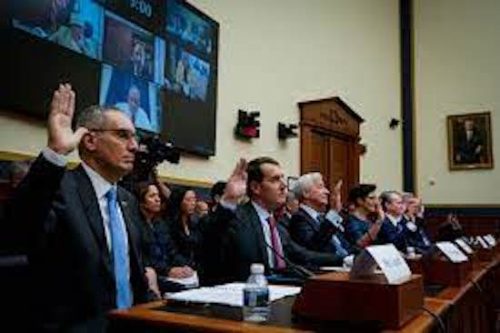Top bosses of top US banks have vowed to adhere to guidance from the government if Beijing invades Taiwan.
Bank executives were pressured by lawmakers on Wednesday during a hearing of the US House Financial Services Committee to take a tougher stance on doing business with China.
Their dealings in China have come under scrutiny amid growing tensions between Washington and Beijing over Taiwan and China’s controversial human rights record.
Republican congressman Blaine Luetkemeyer pressed bank chiefs on how they would respond in the hypothetical event of a Chinese invasion of Taiwan.
Lawmakers also asked the CEOs to condemn China’s “human rights abuses,” in a departure from previous hearings that tended to focus on domestic issues like housing and consumer protection.
“We will follow the government’s guidance, which has been for decades to work with China,” Bank of America chief executive officer Brian Moynihan said. “If they change that position, we will immediately change it, as we did in Russia.”
JPMorgan & Chase CEO Jamie Dimon and Citigroup CEO Jane Fraser both concurred, saying their banks would follow government guidance if China were to invade Taiwan.
ALSO SEE:
JPMorgan, Citigroup
The increased scrutiny underscores the challenges the country’s largest lenders increasingly face as they try to balance commercial interests with pressure from policymakers, activists and investors to take stances on environmental, social and governance issues.
Wall Street giants including JPMorgan, Goldman Sachs Group and Morgan Stanley have sought in recent years to expand their businesses in China, the world’s second-largest economy. Authorities there have granted US banks more ownership of their securities businesses despite rising geopolitical tension and economic competition between the two nations.
JPMorgan, which has been in China since 1921, serves Chinese and international corporations, financial institutions and government agencies. Last year it became the first foreign firm to fully own a securities venture in China.
Citigroup, which was the first US bank to set up shop in China in 1902, last year applied for a mainland Chinese securities licence as part of its push to ramp up business in the market.
Questions Over ‘War in Taiwan’
China has been carrying out military drills near Taiwan in recent weeks. After US House Speaker Nancy Pelosi visited Taipei, China fired missiles into waters near the island, though its activities have since scaled back.
China claims democratically ruled Taiwan as its own territory. Taiwan’s government rejects China’s sovereignty claims.
Congressman Luetkemeyer asked Fraser what Citigroup would do if a war over Taiwan broke out.
“It’s a hypothetical question,” Fraser said. “It’s highly likely that we will have a reduced presence.” Citigroup has a global reach that spans more than 160 countries.
When asked later by Republican Lance Gooden if she would condemn “ongoing human rights abuses in China,” Fraser hesitated. “Condemn is a strong word,” she said. “We certainly are very distressed to see it.”
JPMorgan’s Dimon also warned the United States had to compete with global Chinese banks, which have grown in size over the last few years to become the biggest in the world.
“I am going to do everything in my power to make sure we compete with the best Chinese banks in the world. It is very important for the future of America that America maintains its financial supremacy just like anything else.”
- Reuters with additional editing by Jim Pollard
ALSO SEE:
TSMC Shuts if China Invades Taiwan, Says Boss – Focus Taiwan
Taiwan Says China Attack ‘Worse Than Ukraine’ for Supply Chains
US May Slip Into Recession if Taiwan Chip Link is Cut – CNBC
























